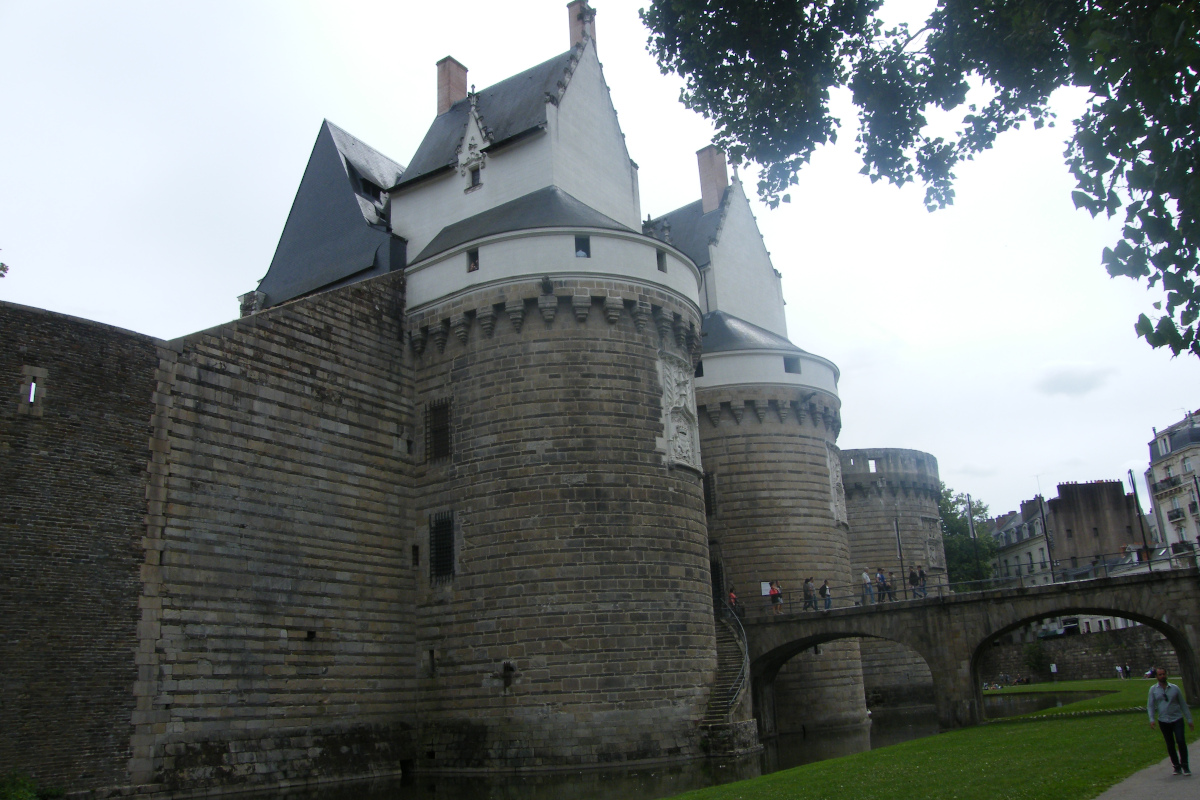
3. from Nantes to Pont-St-Martin
This stage starts in the centre of Nantes, with all its emblematic sites such as the cathedral, the castle of the Dukes of Brittany, the LU building, the Beaulieu Island... It continues by crossing the purely urban Rézé. After passing the Nantes bypass, it continues along small roads through woods and streams.
6 points of interest
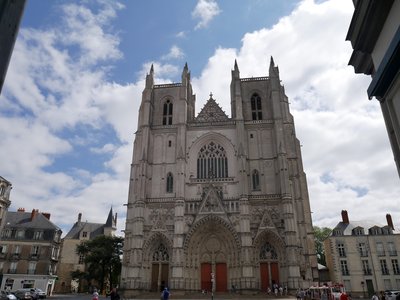
Façade de la cathédrale de Nantes - Amis saint Colomban St ColumbanSaint Peter and Saint Paul's Cathedral in Nantes
Tradition dates the first building back to the arrival of St. Clair in the 3rd century. He had brought from Rome a nail from the cross of Christ.
Archaeological excavations at the beginning of the 20th century identify a building from the 6th century. This cathedral was consecrated between 567 and 580.
Saint Columban probably prayed in this building during the days spent waiting for a ship to Ireland, which was too loaded to take to the sea and put the Irish saint and his companions on the shore who set out again towards the north of Gaul.
The Romanesque Cathedral led to the modification of the choir which dominates the 12th century crypt.
The present building was begun in the 15th century and the work lasted until the 17th century. During the Revolution the cathedral escaped destruction.
Violent bombings in 1944 led to a complete restoration of the building.
The nave shelters the tombs and the tombstones of Duke François II of Brittany and his wife Marguerite de Foix (parents of Anne of Brittany).
One can admire the cenotaph of General Louis Juchault de Lamoricière, his decisive military actions contributed to the rapid pacification of French Algeria in the 19th century, a monument erected in 1878.
A very beautiful exhibition of the history of the cathedral is presented in the crypt, accessible from the outside at the chevet level.
More details : Wikipedia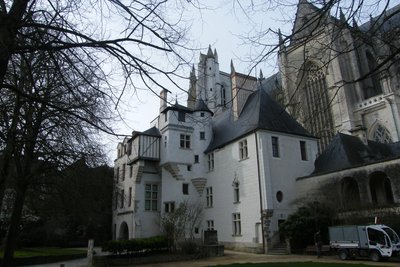
Hôtel de La Psalette - Amis Bretons de Colomban HistoricalThe Psallette
A la fin du 15ème siècle, le développement du château et de la cour ducale entraîne la construction, par les hauts dignitaires, d’hôtels à proximité. L’hôtel de la Psallette est ainsi édifié en 1462 par Jean Gougeul de Rouville qui y mène une vie publique et privée.
Au 19ème siècle, l’hôtel accueille la maîtrise de la cathédrale (la psallette) qui lui donne son nom.
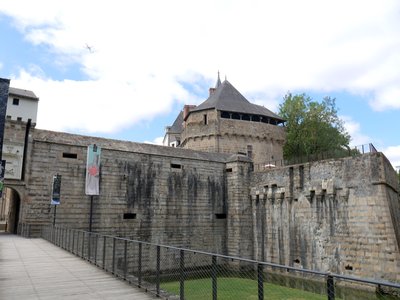
L’entrée du château des ducs de Bretagne à Nantes - Amis saint Colomban HistoricalCastle of the Dukes of Bretagne
Located in the historic heart of Nantes, the Castle of the Dukes of Brittany is the flagship monument of its urban heritage, along with St Peter's Cathedral.
On the city side, it is a defensive fortress whose 500-metre-long rampart walk is punctuated by seven towers linked by curtain walls founded in the 13th century.
On the courtyard side, it houses an elegant 15th century ducal residence made of tufa stone, in flamboyant Gothic style bearing the first signs of Renaissance inspiration, and other buildings dating from the 16th and 18th centuries. These contrast in their whiteness and sculpted refinement with the harshness of the exterior walls made of granite blocks separated by schist layers.
More info at: Wikipedia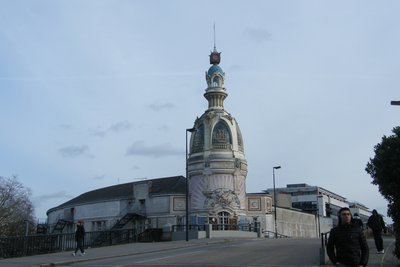
Ex-Usine LU - Amis Bretons de Colomban CulturalThe Unique Place
The "Petits Beurres" LU biscuits with their teeth were born in Nantes.
The Lefèvre-Utile company started the construction of the production plant in 1895. Only one of its two Art Nouveau towers remains today. In 1986, production was transferred outside the city. The cultural milieu then appropriated the industrial wasteland and the Lieu Unique was created in 2000.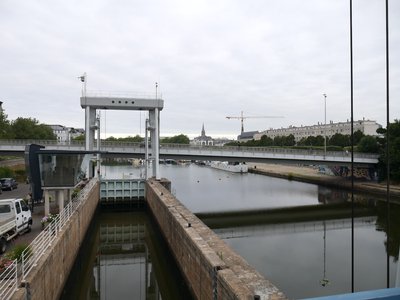
L’entrée au port de plaisance sur l’Erdre - Amis saint Colomban TouristPort Saint-Félix in Nantes
The Via Columbani crosses the Saint-Felix lock.
The river, the Erdre, runs through the city centre of Nantes. A 700 m long tunnel leads into the port of Saint-Félix. This river tunnel was dug in the 1930s as part of the work to fill in the Erdre river to allow the Nantes-Brest canal to flow into the Loire.
The lock and landfill works were built at the same time as the tunnel in the early 1930s. This structure ensures the outlet of the Erdre into the Loire. It consists of a 50 m long by 7 m wide lock for the passage of boats, a removable weir and two bottom gates for regulating water levels.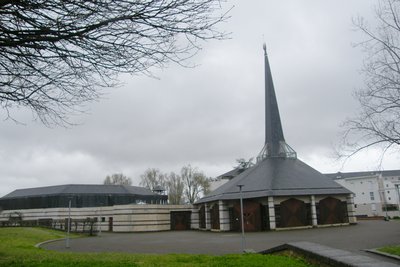
ND des Lumières - Amis Bretons de Colomban CulturalChurch of Our Lady of Lights
The convent and the Carmelite church of Nantes are dedicated to Notre-Dame de Lumières in memory of an ancient carmel from the Luberon.
Situated on an esplanade on Allée Titus Brandsma, on Île Beaulieu, the church was built from 1992 to 1994 on the project of the architect Bertrand Lemaire.
This pentagon-shaped convent church around the altar resembles a large marabout tent.
The spire rises more than 30 metres above the church. It is surmounted by the three flames of fire emblematic of the mystical quest of Carmel.
Description
- Cross the bridge and at its exit, turn right into the rue du Dos d'Ane. and cross the bridge over the Sèvre Nantaise river. Continue straight ahead on the small street Alsace Lorraine, and, at its end, the avenue de la IVème République. Continue straight ahead on rue Jean Jaurès, rue Aristide Briand, rue Charles Rivière, rue Ernest Sauvestre. At the Bus Ragon stop, turn right onto rue de La Bauche Thiraud.
- Follow this street until the roundabout to the shopping centre. Continue on the same street that passes on the left of the retirement home. At the roundabout turn left towards Pont-St Martin and cross the four lanes. At the end of the bridge, turn right onto Boulevard Alfred Nobel and follow the MIN, then turn right onto Chemin des Fontaines Laurent. Continue to Champsiome (or Champ Siôme). After passing under the medium-voltage line, turn right onto Rue du Champsiome.
- At the exit of the town, turn left, rue de Lavau. Continue on this road up to the stop sign with the route de la Grande Bauche (D76). Turn right and join the D65 at the entrance of Pont St Martin. Turn left and join the church.
- Departure : St Peter and St Paul's Cathedral, St Peter's Square, 44000, Nantes
- Arrival : Church of Pont St Martin, Rue du Pays de Retz, 44860, Pont St Martin
- Towns crossed : Pays de la Loire
Altimetric profile
Report a problem or an error
If you have found an error on this page or if you have noticed any problems during your hike, please report them to us here:



